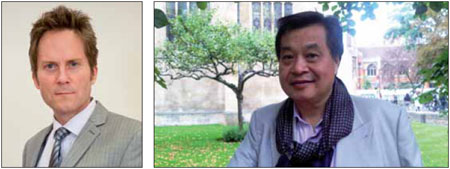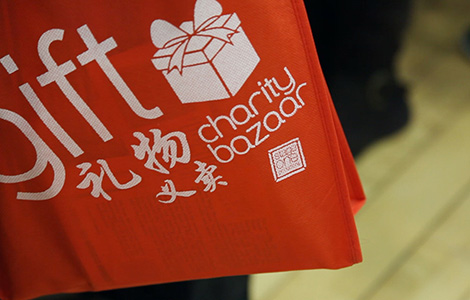Bitter Pill
Updated: 2013-11-22 10:31
By Zhang Chunyan (China Daily Europe)
|
|||||||||||
|
Left: Robert Verkerk, founder of the Alliance for Natural Health. Right: Man Fong Mei, chairman of the Chinese Medical Council UK and president of Mei's Group in London. Photos Provided to China Daily |
Needle success
Though industrially manufactured herbal products are facing problems, TCM clinics are banking on acupuncture, massage and other treatment procedures to further expand in Europe.
Nick Pahl, CEO of the British Acupuncture Council, the leading self-regulatory body for the practice of traditional acupuncture in the UK, says it has been estimated that the demand for acupuncture treatment has almost doubled in the past decade to more than 4.5 million treatments every year. "This indicates that acupuncture is one of the most popular forms of treatment in the UK.
"British patients believe that acupuncture is effective and has no side-effects," Pahl says, adding that acupuncture also falls under the British National Health Service.
"The increasing research evidence base for acupuncture and the recommendations from the National Institute for Clinical Excellence, especially for lower back pain, headache and migraine have also spurred demand," Pahl says.
"There have been several studies that have proved the effectiveness of acupuncture treatment of chronic ailments like depressions and osteoarthritis."
Dominique Joire, the service manager and senior practitioner at the Gateway Clinic in London, says his clinic accepts TCM referrals from general practitioners and provides acupuncture for more than 300 patients a week, mainly for long-term conditions.
Body acupuncture at Gateway Clinic is used to treat problems such as musculo-skeletal pain, headaches, migraine and cancer symptoms.
Gateway Clinic is 100 percent funded by the NHS, Dominique says. Usually the GPs send the patients to a physiotherapist and only when the physiotherapist cannot solve the problem, will they be sent for acupuncture. "On average the waiting period for acupuncture treatment is about three months," Joire says.
Currently in the UK, there are various forms of acupuncture service. Some are carried out within the NHS, such as Gateway Clinic, which means the patients are referred by their GPs and do not have to pay, says Elizabeth Wilmot, who qualified as an acupuncturist about five years ago, after working as a consultant psychiatrist for 20 years with the NHS.
The downside of this option is that the queue is long and the service is limited, Wilmot says, adding that it prompts several patients to go to private clinics with a charge, such as the Nottingham University Hospitals Self-Pay Pain Clinic.
Almendra Mcbride, a British patient who started taking acupuncture and Chinese medicines on the advice of a friend about 30 years ago, says both are effective, though the capsules take longer to produce the desired results.
Apart from acupuncture, massage and cupping are also becoming more popular, Pahl says.
Acupuncture research and studies are other areas that are gaining ground in Europe. There is already huge demand for courses that are certified by the British Acupuncture Accreditation Board. There are also universities and colleges that offer degree level courses in London and four other towns.
After students complete a BAAB accredited course they can opt to join the British Acupuncture Council, which has more than 550 students on its rolls.
Pahl expects the number of students to increase with the recent launch of two new teaching institutions, at City College in London and the Acupuncture Academy in Leamington.
The British Acupuncture Council is a member of the European Traditional Chinese Medicine Association, with members from across Europe, Pahl says, adding that acupuncture is also popular in Germany.
There are both Chinese-trained and Western-trained acupuncture practitioners. But for TCM practitioners, "acupuncture is only part of Chinese medicine, and the combination of acupuncture and TCM is a very good methodology for treatment. Without TCM, it is not complete", Mei says.
"Acupuncture is good as a business tool. But TCM, with its long history and rich clinical experiences, offers a great deal of benefits to patients."
Mei, who has been fighting for a decade to push TCM into the mainstream, says TCM practitioners should finally get legal status in the UK.
Research moves
Though TCM practitioners are facing tough times, much progress is being made in combining traditional forms of Chinese and Western medicine.
In September, experts from universities in Cardiff and Peking said they had discovered a TCM formula that stops cancers from spreading.
Jiang Wen, a professor at Cardiff University, describes the breakthrough as "ancient medicine, modern thinking". The two universities have worked together for more than two years. The formula, consisting of 14 herbs, was known to be beneficial to cancer patients but until this latest research, the way in which it works had remained unknown.
European drug makers are also exploring ways, including joint ventures and joint partnerships, to combine Western approaches to drug discovery with the material repertoire of TCM.
In 2009, Novartis AG of Switzerland announced a TCM-related R&D venture in China and said it plans to spend $80 million to merge and acquire Chinese TCM enterprises in the coming years.
In addition to creating partnerships, some European pharmaceutical companies have also chosen to work with Chinese academic research institutes, given the local partners' rich resources in talent, basic research and academic expertise.
France's largest drug maker, Sanofi-Aventis SA, has worked with the Hong Kong University of Science and Technology to develop modern versions of traditional Chinese medicines to treat chronic diseases such as diabetes and cancer.
However, experts feel that in the long run, TCM still has to go through the medicine registration process if it wants to gain acceptance as medicine and not as food.
Mei says: "It depends on what we do and how we modernize Chinese medicine. It also depends on the Chinese government's efforts to support the Chinese medicine globally."
Wang Mengzhen and Wang Mingjie contributed to this story.
zhangchunyan@chinadaily.com.cn
Today's Top News
Liaoning begins its 1st long-distance training
Nuclear power 'to fall short of demand'
Caroline Kennedy visits tsunami-struck areas
China to loosen airspace control
China inks regulation to ban official extravagance
9 in police custody after pipeline blasts
Experts doubt smog linked to low birthrate
China, Romania seal railway deals
Hot Topics
Lunar probe , China growth forecasts, Emission rules get tougher, China seen through 'colored lens', International board,
Editor's Picks

|

|

|

|

|

|






